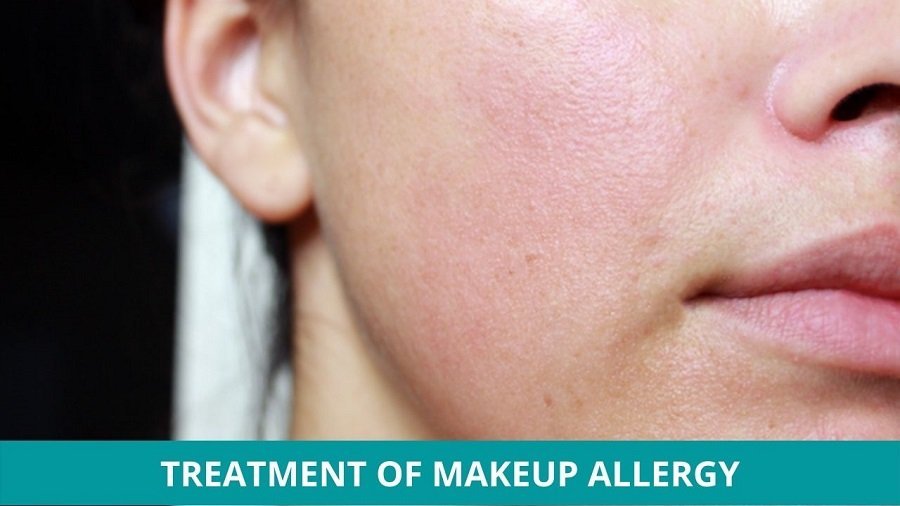As an Amazon Associate, I may earn a commission from qualifying purchases. Please note that you are never charged any extra for that.
To stop makeup allergies, the most effective approach is to identify the allergen and avoid using it or any products containing it. In addition to this, practicing good hygiene and using hypoallergenic products can also prevent allergies.
Makeup allergies can be caused by various ingredients in the products, including fragrances, preservatives, and dyes. It can result in symptoms such as redness, itching, and swelling. Some people may even experience a severe reaction known as anaphylaxis. Identifying the allergen can be challenging, but it is crucial to prevent future reactions.
In this article, we will discuss various ways to identify and avoid makeup allergies. We will also provide tips on how to choose hypoallergenic products and practice good hygiene to prevent allergies.

Credit: www.iafaforallergy.com
Table of Contents
Understanding Makeup Allergies
Makeup allergies can be frustrating and uncomfortable. Understanding what causes these allergies is crucial to prevent them from occurring. Symptoms of makeup allergies typically include itching, redness, and swelling. To identify the culprit product, it helps to keep a record of the products used and the reaction experienced.
Common allergens in makeup products include fragrances, preservatives, and metals. Patch testing a small amount of the product on the skin can help identify the specific allergen. If you have experienced makeup allergies before, it is important to read product labels and avoid those containing known allergens.
With proper care and attention, you can prevent makeup allergies and continue to enjoy your favorite beauty products.
Preventing Makeup Allergies
Preventing makeup allergies can be achieved by reading the ingredients list before purchasing any product. It is also important to do a patch test before application to ensure there are no reactions. Additionally, using hypoallergenic products and choosing brands that are suitable for sensitive skin can help.
It’s crucial to avoid commonly overused words/phrases and aim for brief sentences (no more than 20 words). Varying phrases at the beginning of each paragraph helps engage readers. Lastly, this writing should be seo friendly, unique, easy to comprehend and free of plagiarism.
Remember to avoid a conclusion paragraph and strive towards writing like a human to pass ai detection.
Treating Makeup Allergies Through Natural Remedies
Makeup allergies can be a frustrating and painful experience. Natural remedies can soothe the skin and alleviate symptoms. Cold compresses are effective in reducing redness and inflammation. Aloe vera gel has a calming effect and can alleviate itching. Green tea bags are helpful in reducing inflammation and soothe the skin.
Coconut oil is a great moisturizer for dry and itchy skin. By using these natural remedies, one can calm the skin and prevent further reactions.
Treating Makeup Allergies Through Medical Intervention
Makeup allergies can be a real pain for many people. Fortunately, medical intervention can provide some relief. Over-the-counter antihistamines and topical creams are a good place to start. For more severe cases, prescription-strength medications may be required. Allergy shots can be a good option for those seeking long-term relief.
However, it’s important to consult with a dermatologist to ensure a proper diagnosis and treatment plan. Don’t suffer through makeup allergies any longer. Seek medical help and enjoy your beauty routine without discomfort.
Frequently Asked Questions For How Can I Stop My Makeup Allergies?
What Causes Makeup Allergies?
Makeup allergies are caused by the skin’s reaction to certain ingredients in makeup products.
What Are The Most Common Makeup Allergies?
The most common makeup allergies are caused by fragrances, preservatives, and nickel.
How Can I Know If I’M Allergic To My Makeup?
If you experience redness, itching, or swelling after using makeup, you may be allergic to it.
Can I Develop Makeup Allergies Over Time?
Yes, you can develop makeup allergies over time after prolonged exposure to certain ingredients.
What Are Some Makeup Allergy Symptoms?
Makeup allergy symptoms include redness, itching, swelling, blisters, and dryness.
How Can I Prevent Makeup Allergies?
You can prevent makeup allergies by reading product labels, patch-testing new products, and avoiding known allergens.
What Should I Do If I Have A Makeup Allergy?
If you have a makeup allergy, stop using the product immediately and consult a dermatologist for treatment options.
Conclusion
If you’re one of the many people dealing with makeup allergies, taking a few steps to protect your skin can make all the difference. From using hypoallergenic products to avoiding harsh chemicals, you can take control of your skin’s health and safety.
If you’re unsure what’s causing your allergies, try talking to an allergist or dermatologist who can help you identify potential triggers and suggest alternative products. Remember, allergies can be frustrating and even painful, but there are always ways to manage them and keep your skin looking and feeling great.
With a little perseverance and a lot of patience, you can be well on your way to a happier, healthier relationship with makeup.
Leave a Reply